Students Who Are First in Their Family to Attend College Share Stories, Experiences
Nearly one-third of the students at UC San Francisco are the first in their families to graduate from college.
As we spoke with several students across UCSF, common threads emerged from their unique stories. Nearly everyone spoke of learning to ask for help, however uncomfortable – from applying to college, to studying for classes, to identifying a career path. Many were familiar with imposter syndrome, feeling out of their depth and as if they would never catch up. Some said that the pressure to grasp every precious opportunity – the fear-of-missing-out – could be a double-edged sword that led to stress. They all hoped that their experiences would pave the way for younger siblings, cousins, or others in their community.
“It’s so important for first-gen students to know that they are not alone and that UCSF supports and celebrates their successes,” said Alece Alderson, acting assistant vice chancellor for Student Life. “First-gen students are resilient and their background experiences will help them excel in their fields. Our First Generation Support Services offers a variety of mentoring and community-building programs for our amazing first-gen students.”
Each of these student’s stories is also a story of their parents, who were denied by circumstance higher education (or in some cases, any education at all) and worked hard to make it a possibility for their children.
Read more about a few of our first-gen students:
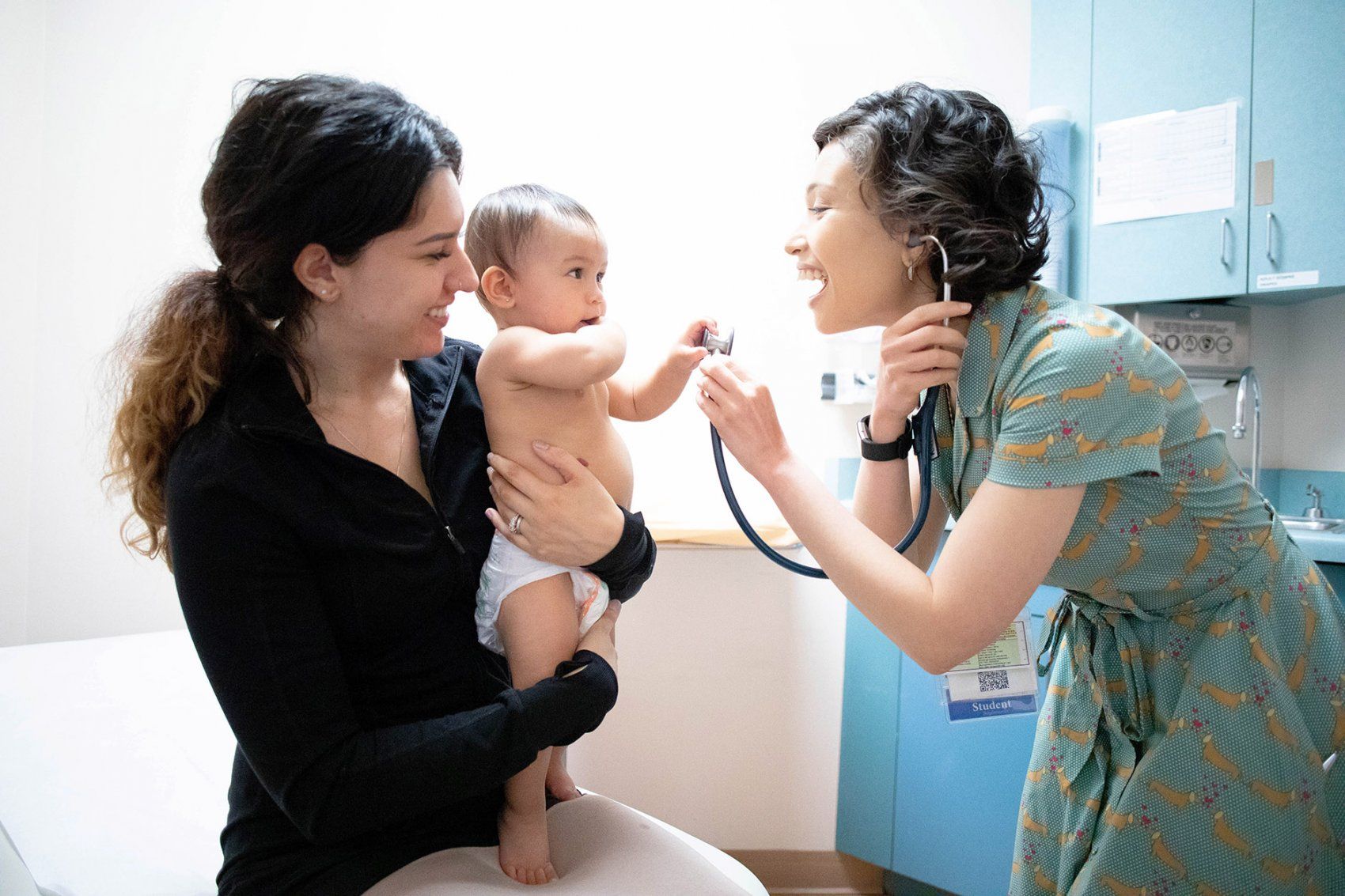
Annie Hoang, a third-year medical student, completes an examination of Simone Batulayan, 9 months, at the UCSF Family Medicine Center at Lakeshore. Photo by Susan Merrell
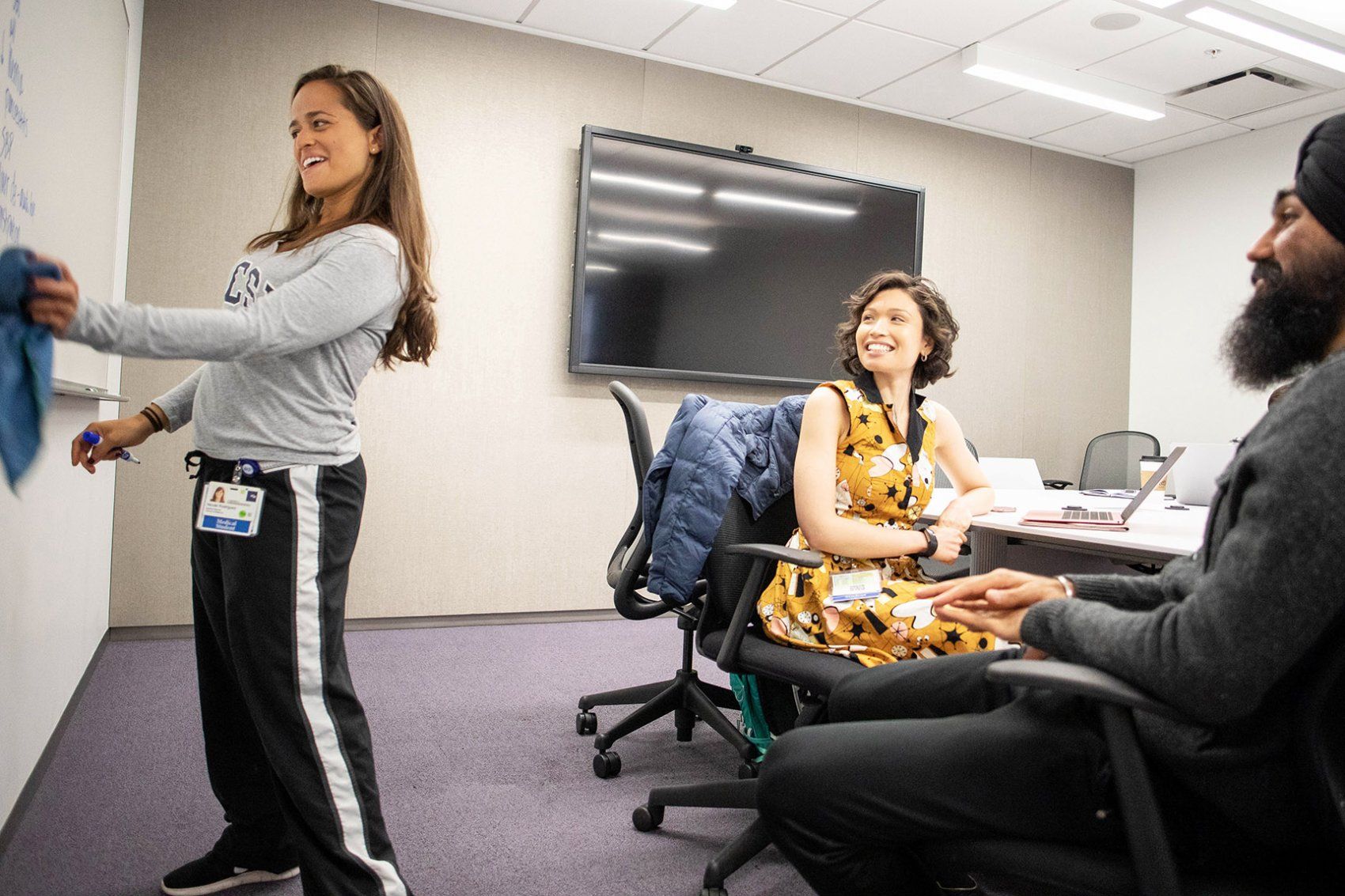
Annie Hoang (center) relates details of one of her patient visits while Nicole Rodriguez takes notes on the board. The class, which included Anuvir Singh (right), is for third-year medical students to help each other analyze patient cases. Photo by Susan Merrell
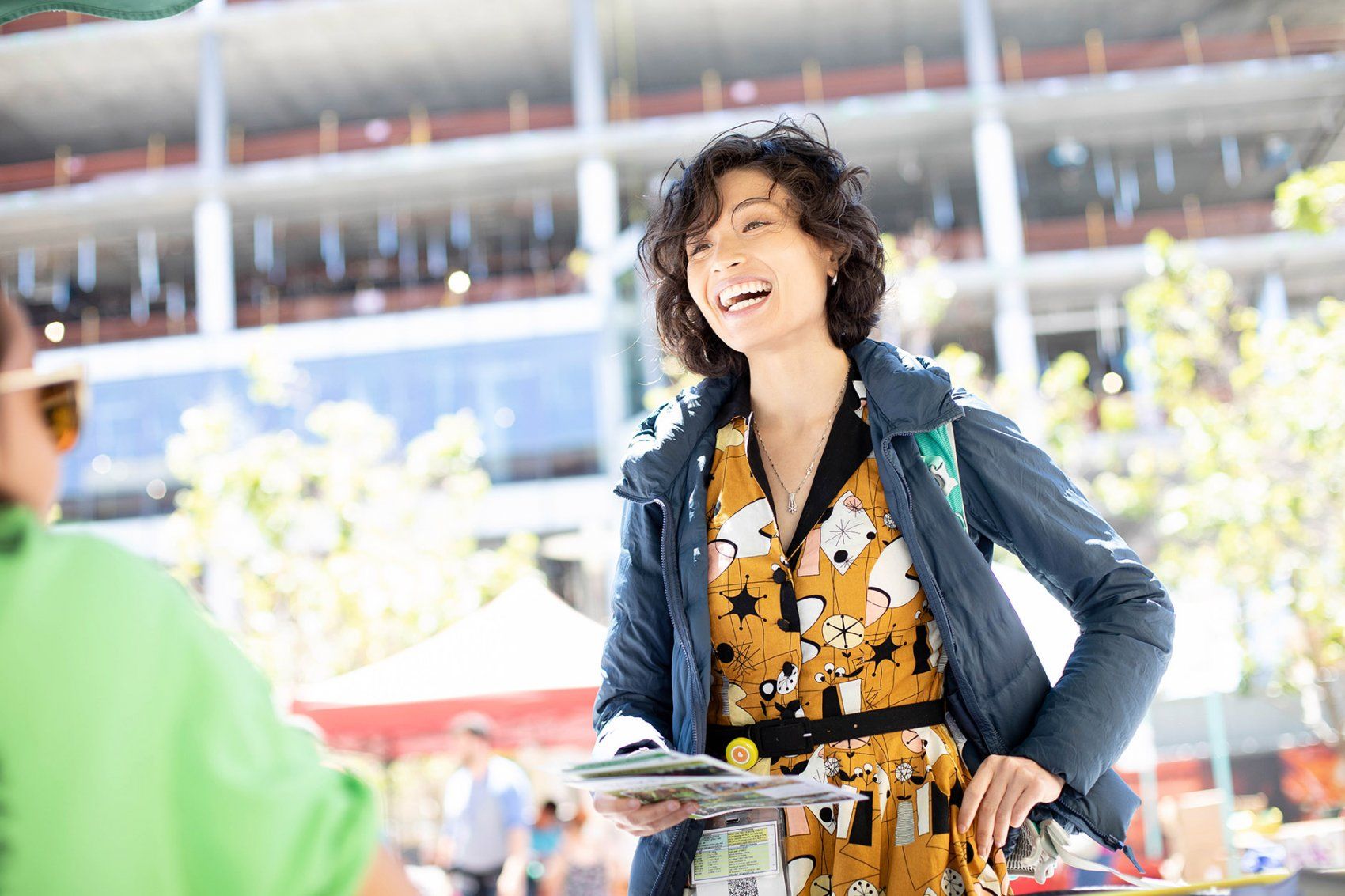
Annie Hoang, a third-year medical student in the Program in Medical Education for the Urban Underserved (PRIME-US), picks up her student food stamps at the farmers’ market that is held on Wednesdays in Mission Bay. Photo by Susan Merrell
Annie Hoang, UCSF School of Medicine ’21
Annie Hoang isn’t just the first in her family to attend college, she’s the first to go to school at all. “I am the first person to attend kindergarten at this point,” she said.
She grew up in a low-income immigrant family in New Jersey and went to a public high school that had nearly 3,000 students, metal detectors at the entrances, and about a 50 percent graduation rate. “As you can imagine, from that type of public high school, there’s not a lot of support, because the guidance counselors were completely overwhelmed with a lot of struggling students,” she said.
You may feel like you have to stay behind and sacrifice your own education to take care of family – sometimes you just have to be bold, go with your gut in terms of the decision that you have made and go forward for yourself.
She had to navigate the college application process on her own. Her guidance counselor did encourage her to apply to college through the Quest Bridge program and told Hoang she’d already written a recommendation for her. “It was someone who believed in me,” remembered Hoang, who is currently an MD candidate in the class of 2021.
Like many first-gens, she said she often feels like she’s just “bumbling along,” hoping things work out. “When you’re the first person, there’s a lot of fear and apprehension that comes with it and there’s a lot of low-self-esteem, just being in denial, like I can’t do this, there’s no freaking way.” She was accepted to Yale as an undergrad with a full scholarship. Today she is enrolled in UCSF’s Program in Medical Education for the Urban Underserved (PRIME-US), a five-year program for students committed to working with urban underserved communities.
Her advice to other first-gen students is to “be bold.” “You may feel like you have to stay behind and sacrifice your own education to take care of family – sometimes you just have to be bold, go with your gut in terms of the decision that you have made and go forward for yourself.” For Hoang, being first-gen is a reminder that “education is such a powerful tool that can open so many doors.” It also means being able to give voice to groups of people who have not been heard before and elevating those voices to make change.
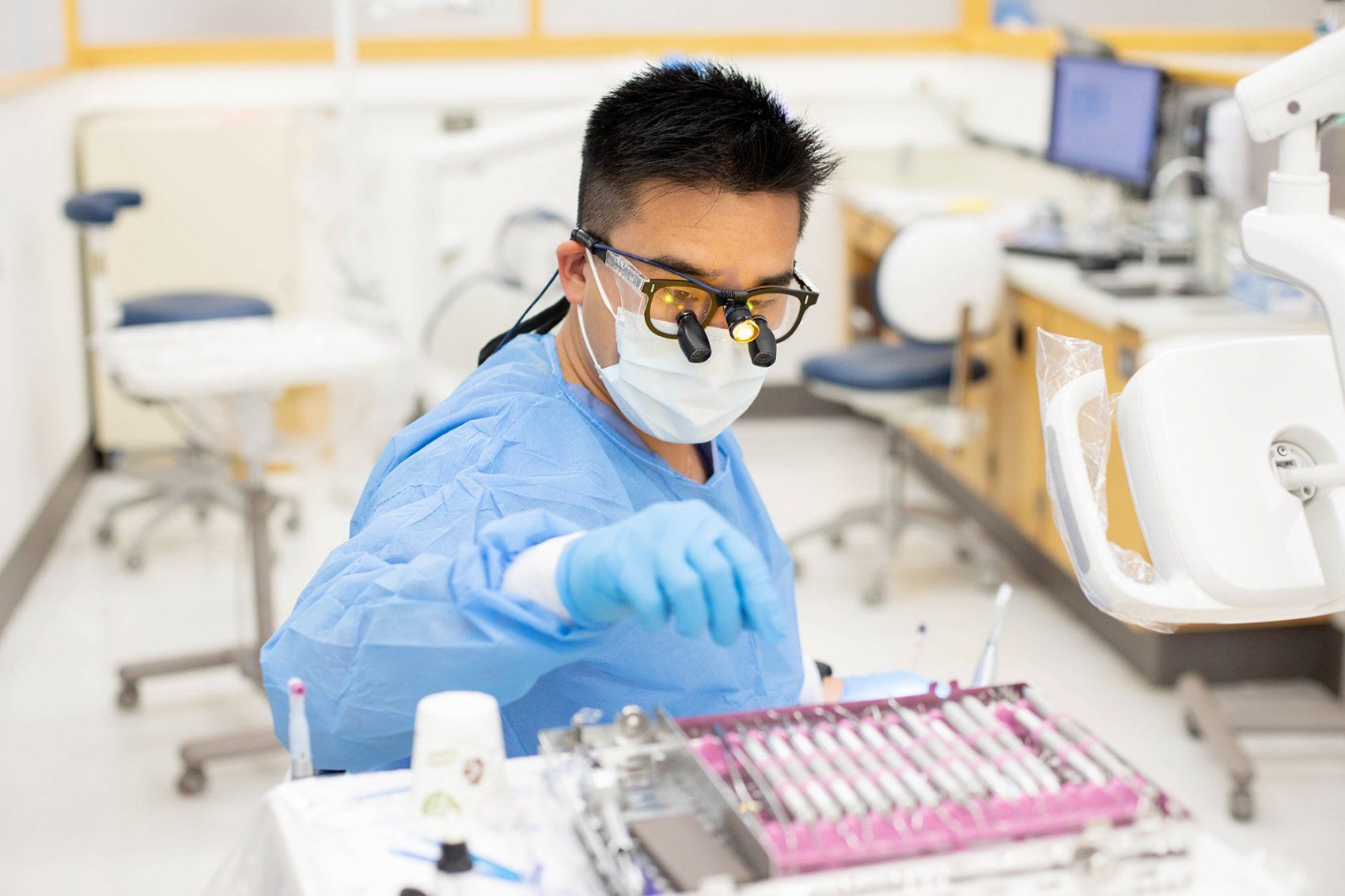
Jerry Liu, a third-year dental student, treats a patient in UCSF Dental Center’s General Dentistry Student Clinic at Parnassus. Photo by Susan Merrell
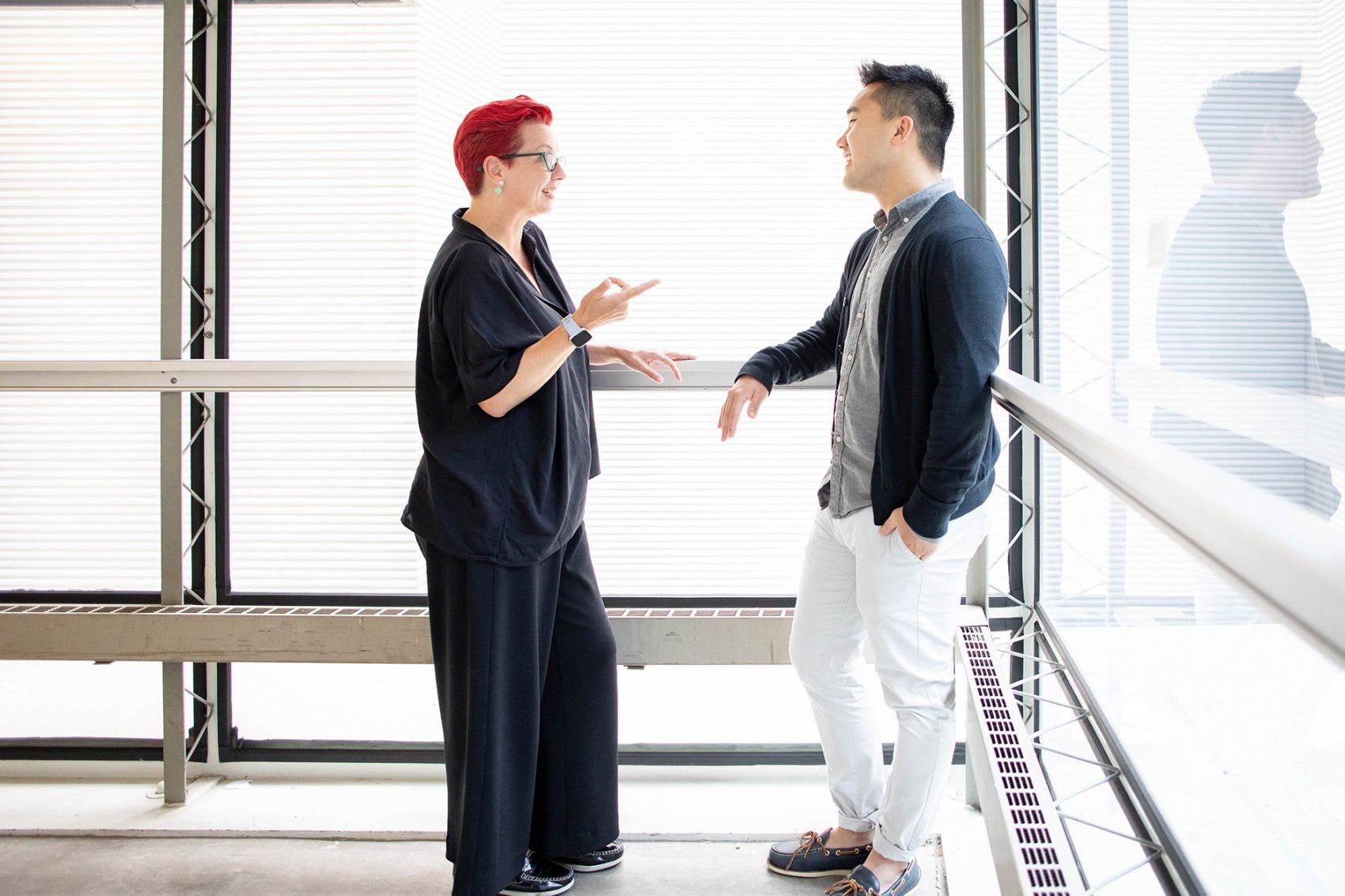
Jerry Liu (right) a third-year dental student meets with his mentor, Sara Hughes, MBE, EdD, MA, BSc. Photo by Susan Merrell
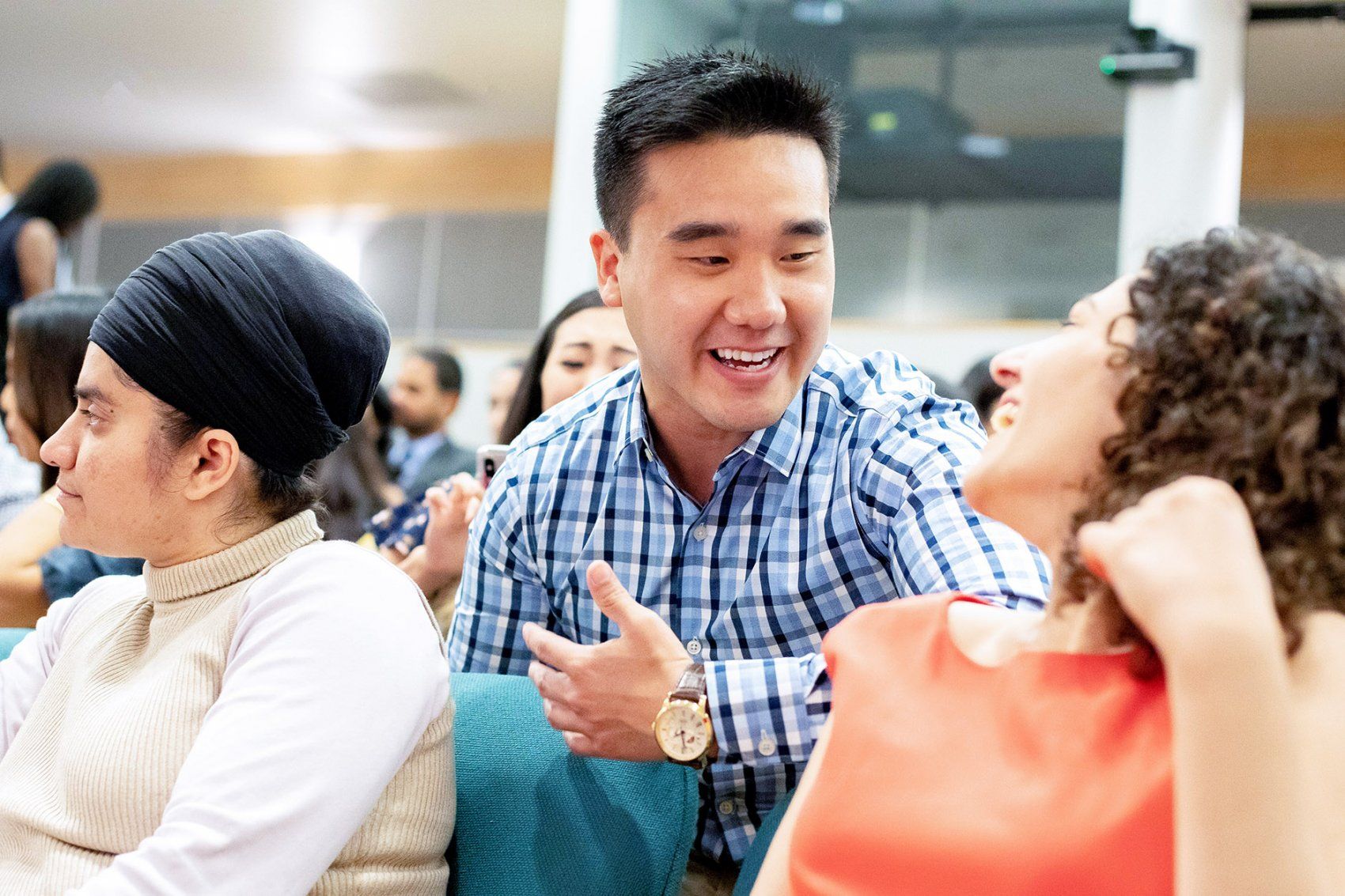
Jerry Liu (center) talks with fellow third-year dental student Niloufar Mohajerani (right) before the start of a clinical orientation at the Parnassus Heights campus. Photo by Susan Merrell
Jerry Liu, School of Dentistry ’21
Like his parents, who own a moving company, Jerry Liu hopes one day also to run his own small business – a dental office.
Yet in almost every other way, his life has been in stark contrast to his parents’. In China, his father, whose family had been active in politics, was thrown into political prison at age 12 and stayed there for almost 30 years. When he was finally released, he left for Africa with dreams of eventually coming to the United States. He met Liu’s mother in the Togolese Republic, where she had been cooking dumplings outside the United States embassy for the embassy workers – eventually this connection gained them visas to the United States.
I would tell my younger self that the things you are doing in life, even though you feel like you’re making mistakes, you’re the first one to do it, so don’t focus too much on the mistakes. Be more forgiving of yourself.
Jerry and his older brother grew up in the San Gabriel Valley of California among Chinese immigrants. Education was always important to his family and he was expected to go to college, but as a first-gen student, he felt lost about why college was important and how it could lead to a professional career.
“My previous exposure to college was literally just Hollywood movies, which is not a really good representation of what you should be doing in college,” he said.
“In my undergrad experience, I focused a lot on my academics, but I didn’t put too much effort into extracurriculars. And I felt, despite being a very good student, I wasn’t able to understand some of the other avenues that allow you to achieve career success.”
Looking back, he sees that he often diminished his accomplishments. “I would tell my younger self that the things you are doing in life, even though you feel like you’re making mistakes, you’re the first one to do it, so don’t focus too much on the mistakes. Be more forgiving of yourself.”
Liu said that because many Chinese-American students come from well-educated families, it’s often assumed he comes from the same background. “My parents don’t speak English, and even though I was born here, this is still a very new country to us,” he said. He chose dentistry partly because it would allow him to practice anywhere and see other parts of the country – the East Coast, Alaska, or parts of rural America. Perhaps he could serve as a first-gen ambassador in a community where college rates are low, he said. “Every time I try something, I think, how do I pass on the lessons I’ve learned from this experience?”
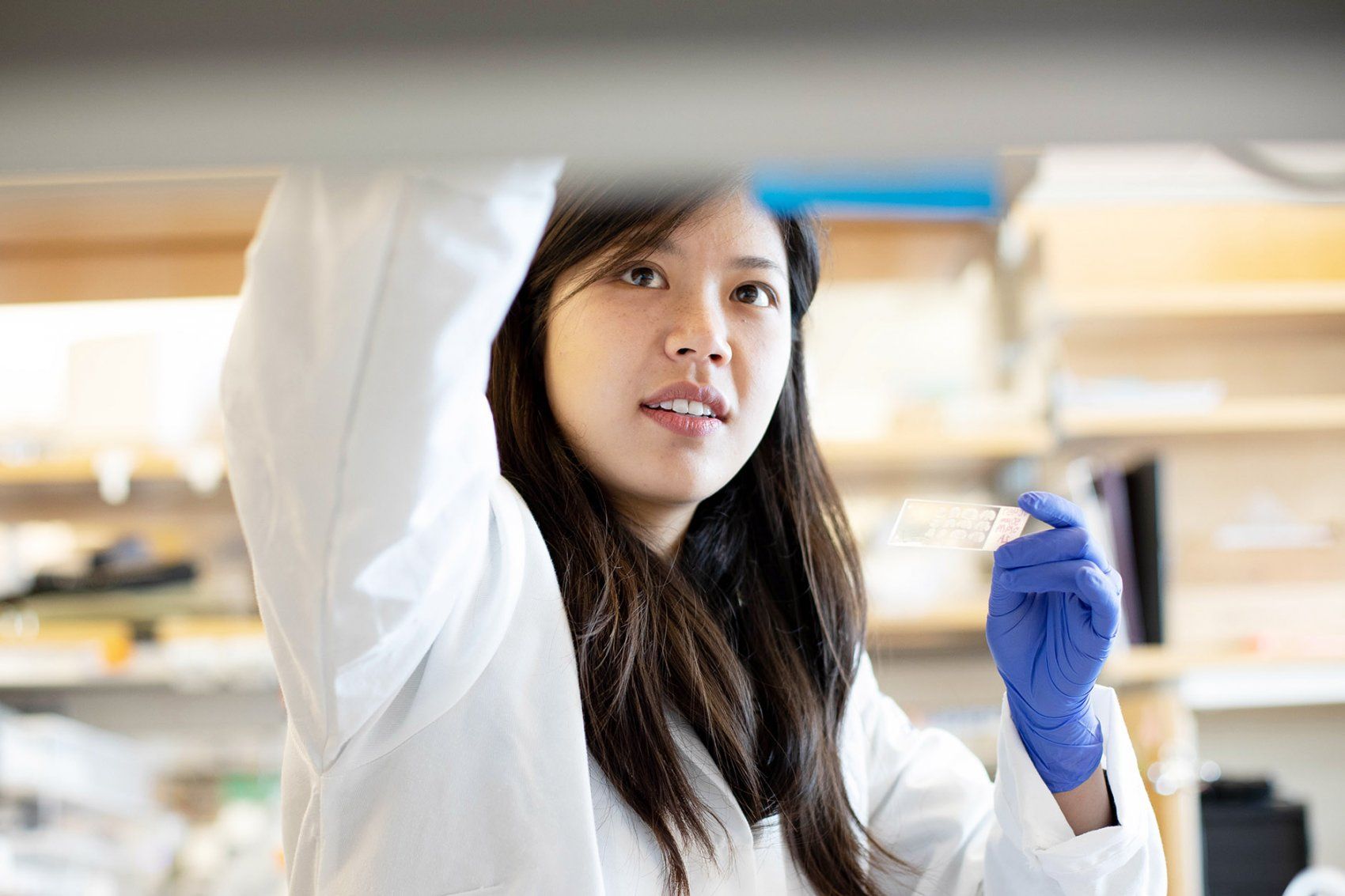
Victoria Cheung, a TETRAD graduate student researcher in neuroscience, works in the laboratory or Evan Feinberg, PhD, at the UCSF Mission Bay campus. Photo by Susan Merrell
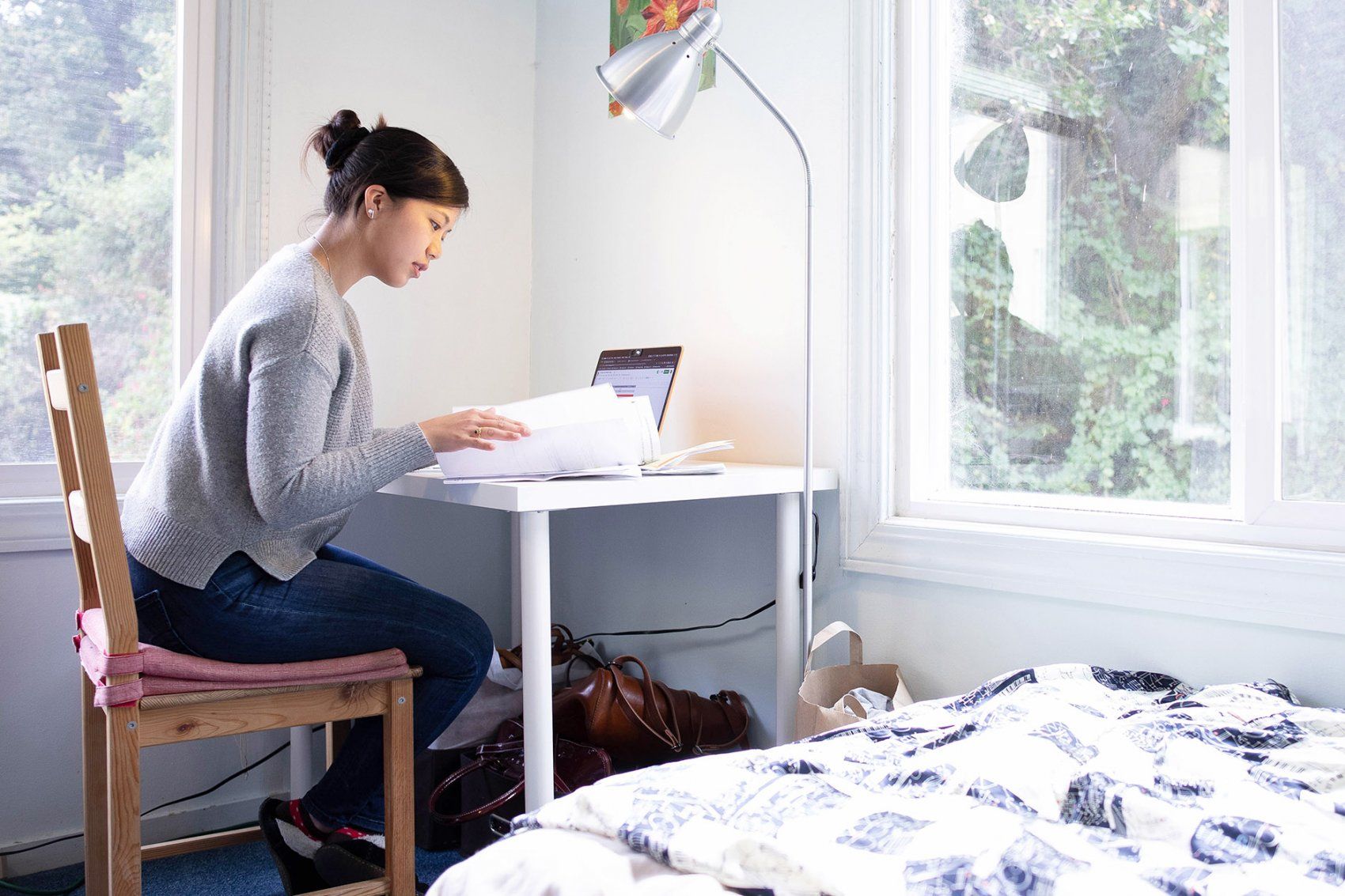
Victoria Cheung, who grew up in a single-mother family and learned how to support herself, works on her budget in the apartment she shares with three roommates in the Forest Hill neighborhood of San Francisco. Photo by Susan Merrell
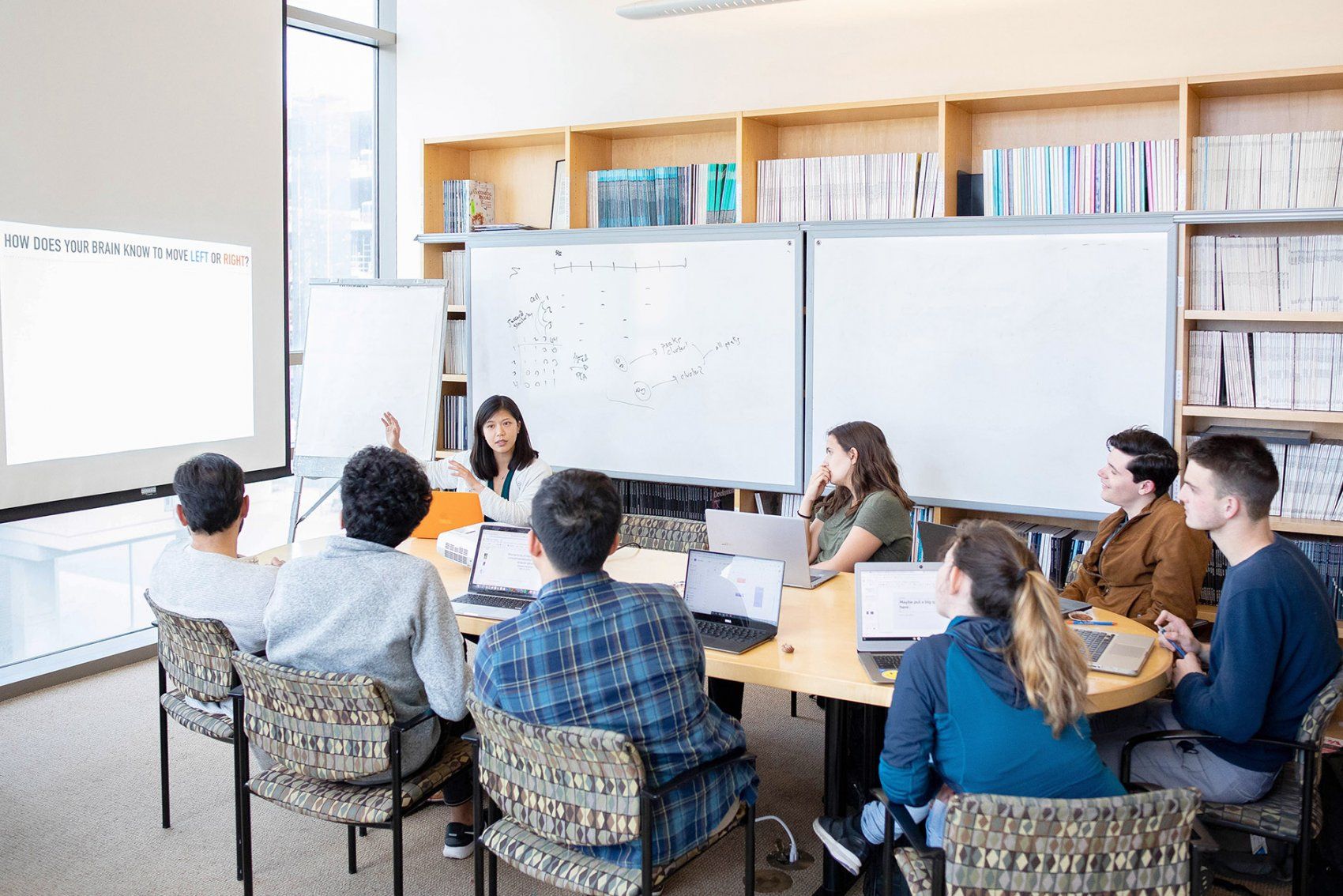
Victoria Cheung (second from left) teaches undergraduate student researchers how to present their research ahead of a research poster presentation event. Photo by Susan Merrell
Victoria Cheung, TETRAD PhD Program
Before Victoria Cheung started working in a lab as an undergrad, she had no idea that people could study to obtain PhDs. “I had previously thought they were either awarded to geniuses or given to people who had worked in that field for a very long time,” she said. Even as she fell in love with science, she was confused about how to pursue a career in the field and subsequently, how to apply to graduate school.
Cheung and her siblings were raised in a single-parent household by their “fiercely headstrong mom,” a Cambodian genocide survivor who, despite the hardships she endured, maintained a positive attitude and raised her kids to do the same.
When I was accepted to UCSF, I honestly just cried. It was a moment of catharsis, disbelief, and security. Finally, the person with no career goals was finally making plans for herself.
Cheung grew up without the resources that many of her peers took for granted. In the beginning of high school, her family didn’t have internet, so she stayed late at the public library to do homework. In college, in 2013, she didn’t own a phone, so when she applied to programs that helped underprivileged students, she couldn’t give them a phone number for the interview. She said the absence of role models contributed to a lack of motivation to do well academically and contributed to a lack of confidence in her own capabilities. “I fought hard with imposter syndrome and thought I would never be good enough,” she said.
“When I was accepted to UCSF, I honestly just cried. It was a moment of catharsis, disbelief, and security. Finally, the person with no career goals was finally making plans for herself.”
Cheung is now pursuing a PhD in the UCSF TETRAD program, an interdisciplinary graduate program that values curiosity-driven research in biology.
“I would tell my younger self that it’s OK to struggle,” said Cheung. “I would tell her that her lack of resources would foster creativity and resourcefulness. I'd tell her that eventually, she'd figure out life bit by bit and that it’s OK to figure it out slowly and to sometimes to feel behind.”
“Being a first-gen student is a representation of how hard my family has worked to break out of the cycle of poverty,” said Cheung. “It isn't my own achievement, but rather their lifelong support and care that enabled me to become a first-gen student. To me, it signifies that you aren’t bound to the conditions you were born into. Though it takes time, a crazy amount of grit, and perhaps many generations, you can make great strides towards change and a better life.”
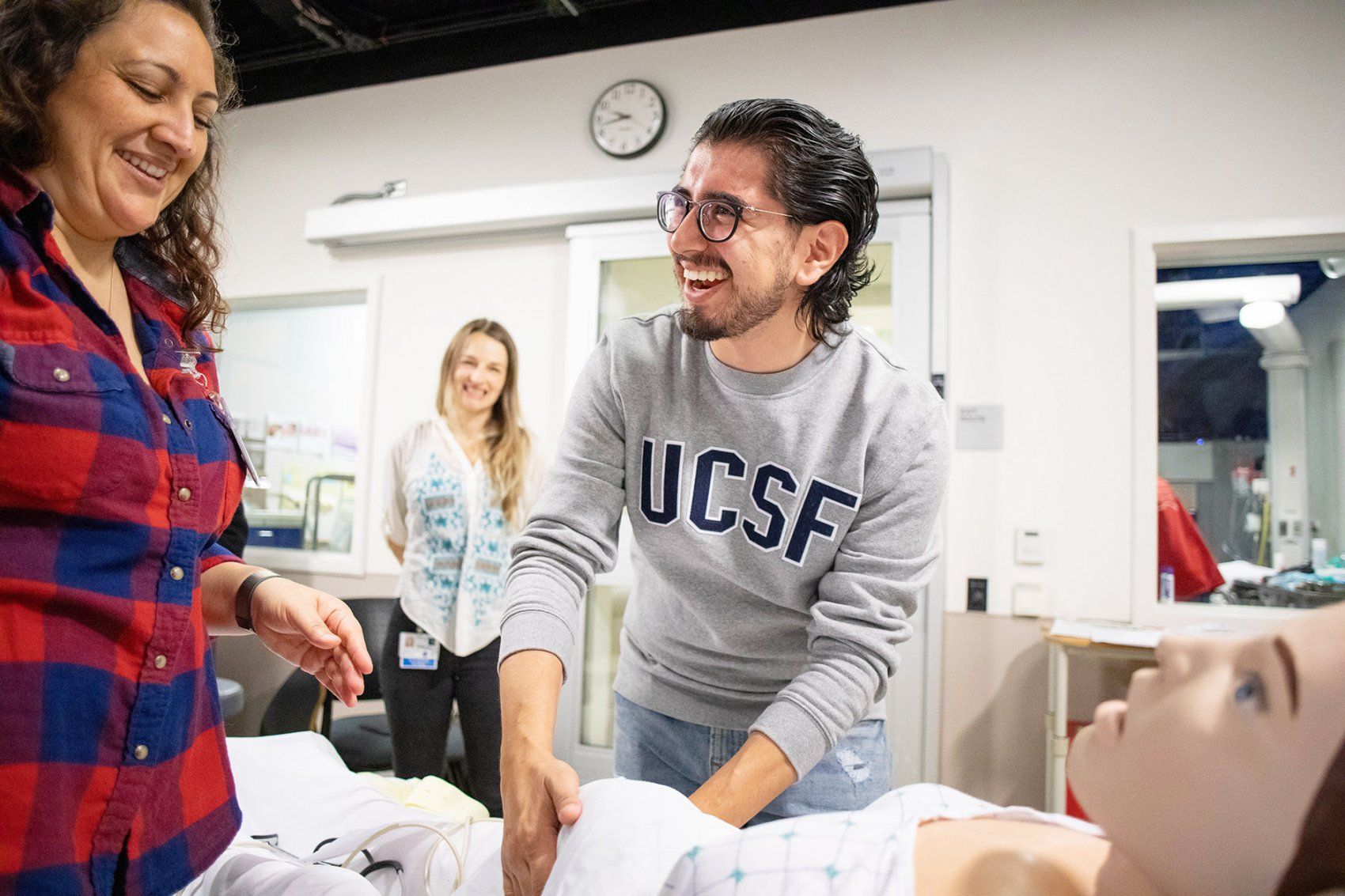
Frank Molina (right) with fellow School of Nursing students Kathrine Kemp (left) and Tamara Nelson in the Kanbar Center, where they were working in a labor and delivery simulation class. Photo by Susan Merrell
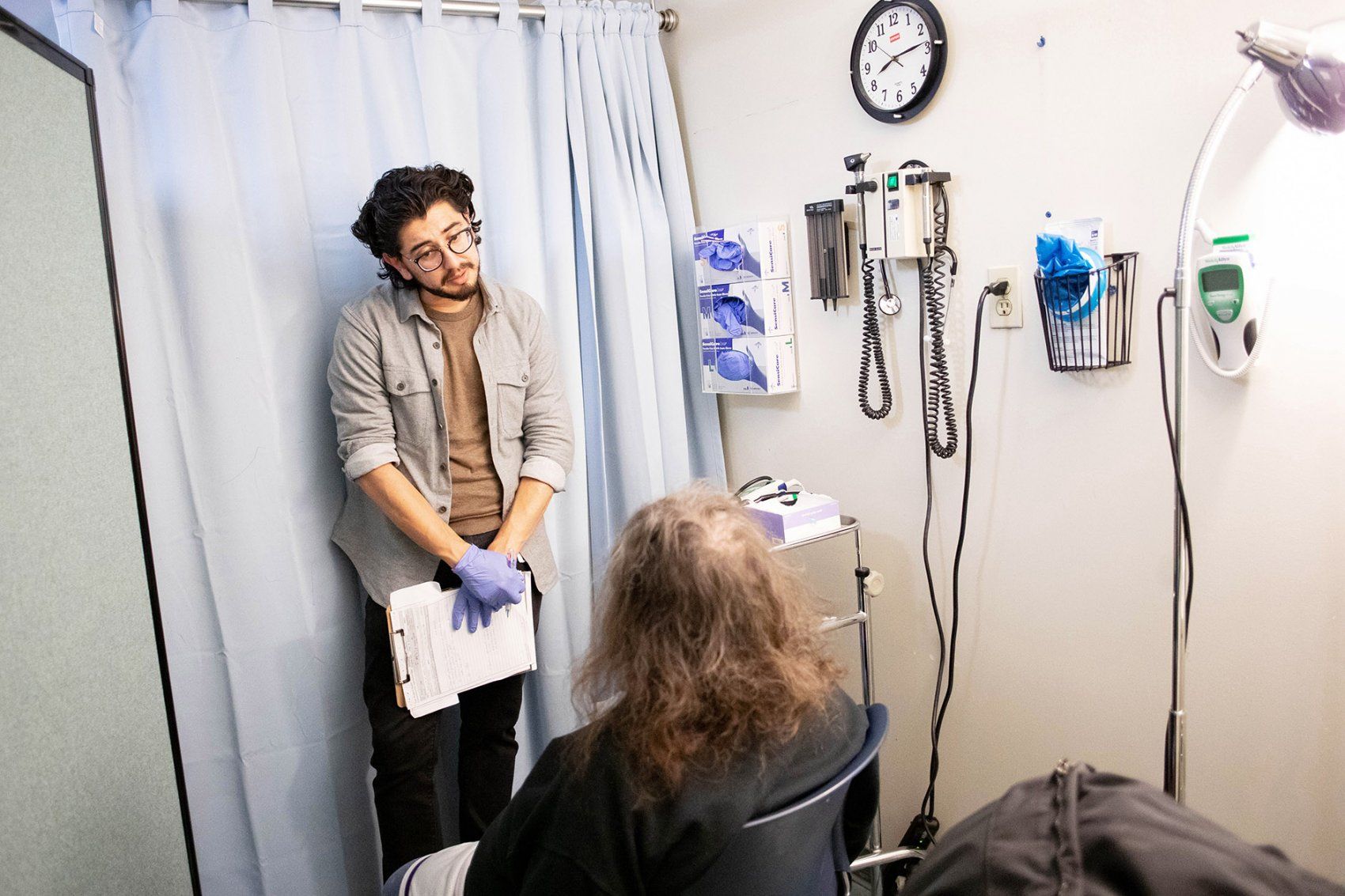
Frank Molina, a third-year nursing student, talks with patient Linda Martinez in the student-run Homeless Clinic that is located in the St. Vincent de Paul shelter in San Francisco. Photo by Susan Merrell
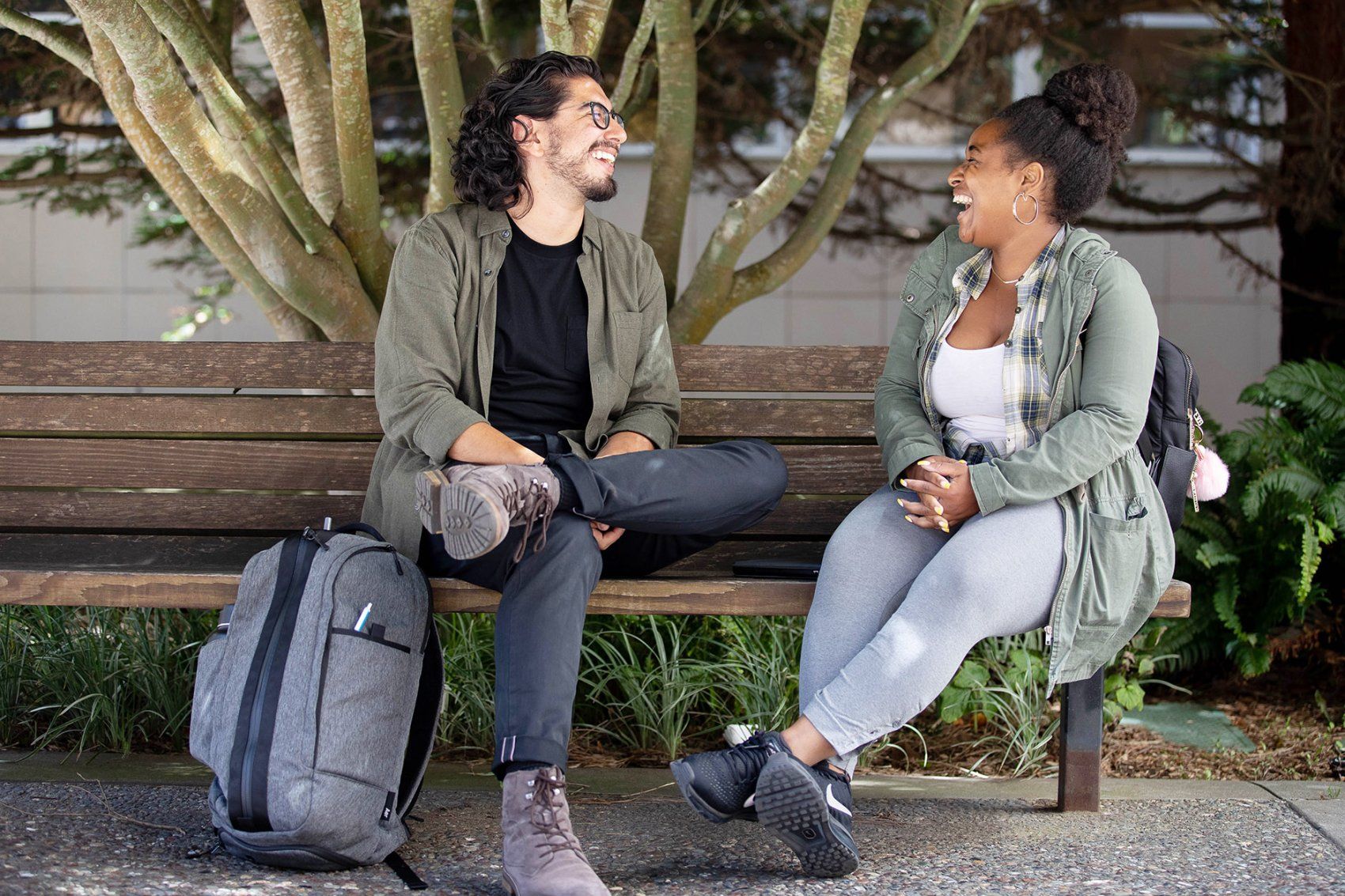
Frank Molina (left) talks with Chantal Davis, a first-year midwifery student in Saunders Court on the UCSF Parnassus Heights campus. Photo by Susan Merrell
Frank Molina, School of Nursing ’21
When Frank Molina found out he’d gotten into college, he was in disbelief. “I did not expect to have the number of options I was presented with, nor did I expect to be accepted to schools so far away,” he said. Having grown up in the Bay Area, Molina gave up everything he was familiar with and moved to Baltimore to attend Johns Hopkins University.
Oftentimes being a first-gen student is cast in a negative light, as if we are missing something because we are the first to go to college. Instead, I think that first-gen students have so much to offer, from our resourcefulness and tenacity coming from having to do so much on our own to the fresh and different ways that we look at societal issues.
Besides navigating the college process on his own “through trial and error,” the biggest challenge of being a first-gen student for Molina has been learning how to say “no.”
“As a first-gen student, I want to take advantage of all of the opportunities offered by the schools that I attend,” he said. That has included lab and fieldwork research, studying abroad, and the many leadership and volunteer roles he now juggles while working toward his nurse practitioner degree. “While these experiences have been foundational to who I currently am as a student at UCSF, the amount of stress I place on myself to be as involved as I have been is taxing,” he said.
At UCSF, Molina is enrolled in the Master's Entry Program in Nursing (MEPN) and studying to be an adult/gerontology primary care nurse practitioner.
What advice would he give his younger, pre-college self? “I would tell myself to take a break every once in a while and have some fun,” he said. “And not to feel guilty about leaving your family to get an education – they’re always going to be there rooting for you.”
Reflecting on what it means to be first-gen, Molina said, “For me, being a first-gen student has been entirely about opportunity. Oftentimes being a first-gen student is cast in a negative light, as if we are missing something because we are the first to go to college. Instead, I think that first-gen students have so much to offer, from our resourcefulness and tenacity coming from having to do so much on our own to the fresh and different ways that we look at societal issues. Being first-gen isn’t a burden, it’s a strength!”
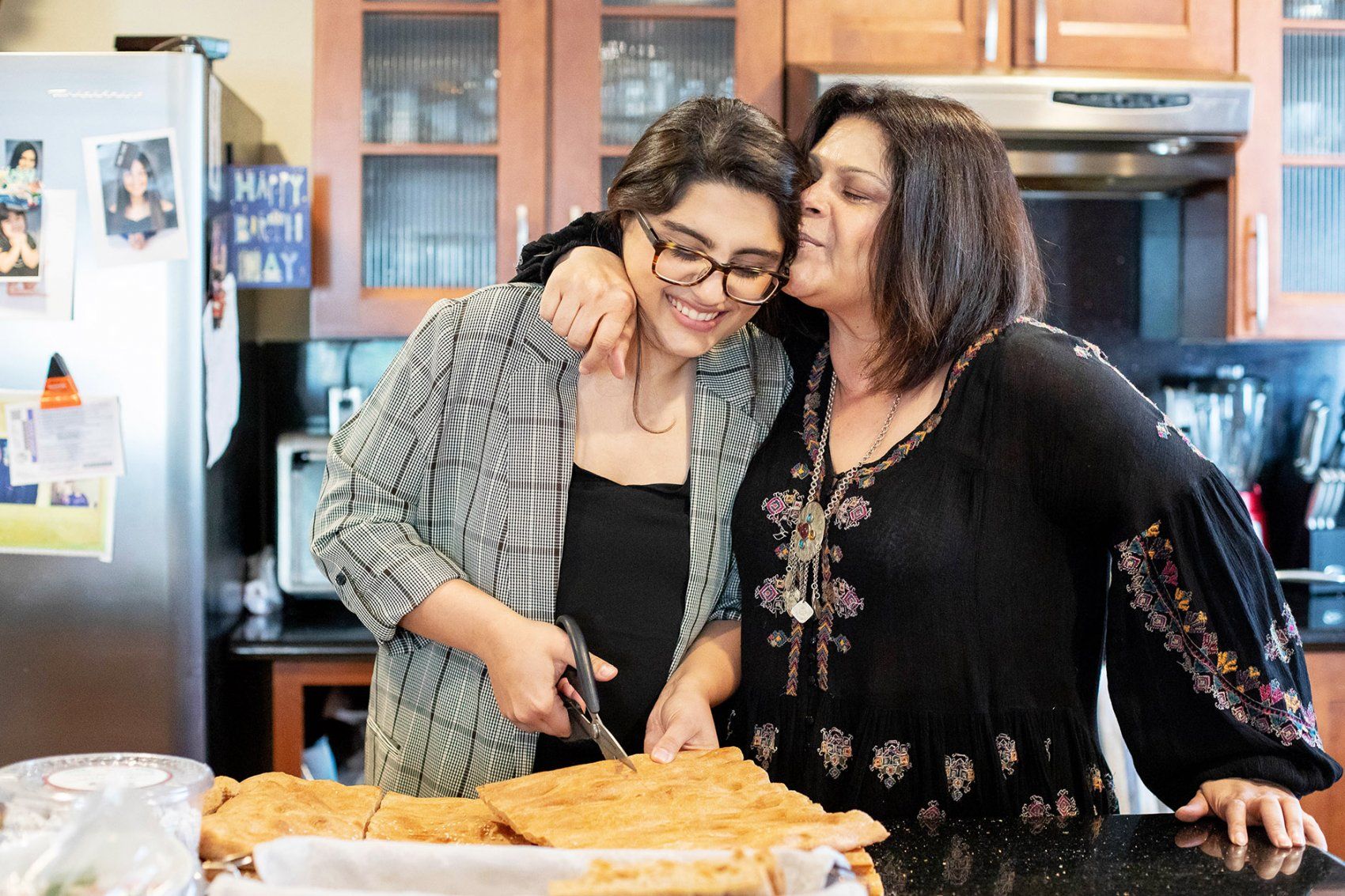
Hanna Yakubi (left) a third-year pharmacy student gets a kiss from her mom, Narwan Yakubi as the two prepare dinner at the family’s home in Fremont, Calif. Photo by Susan Merrell
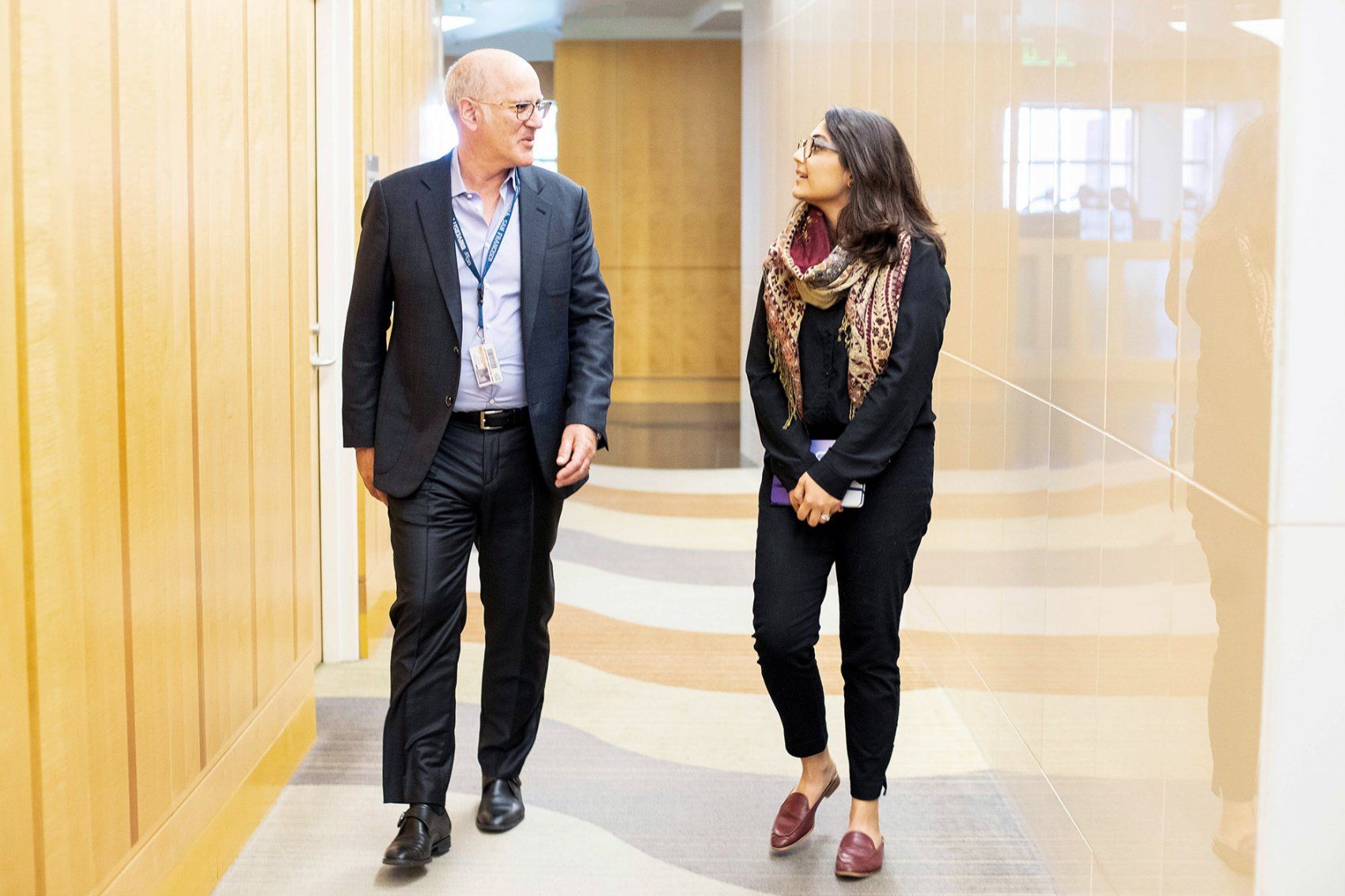
Hanna Yakubi (right) talks with her mentor, Kevin Rodondi, PharmD, professor of clinical pharmacy. Rodondi was also the first in his family to attend college. Photo by Susan Merrell
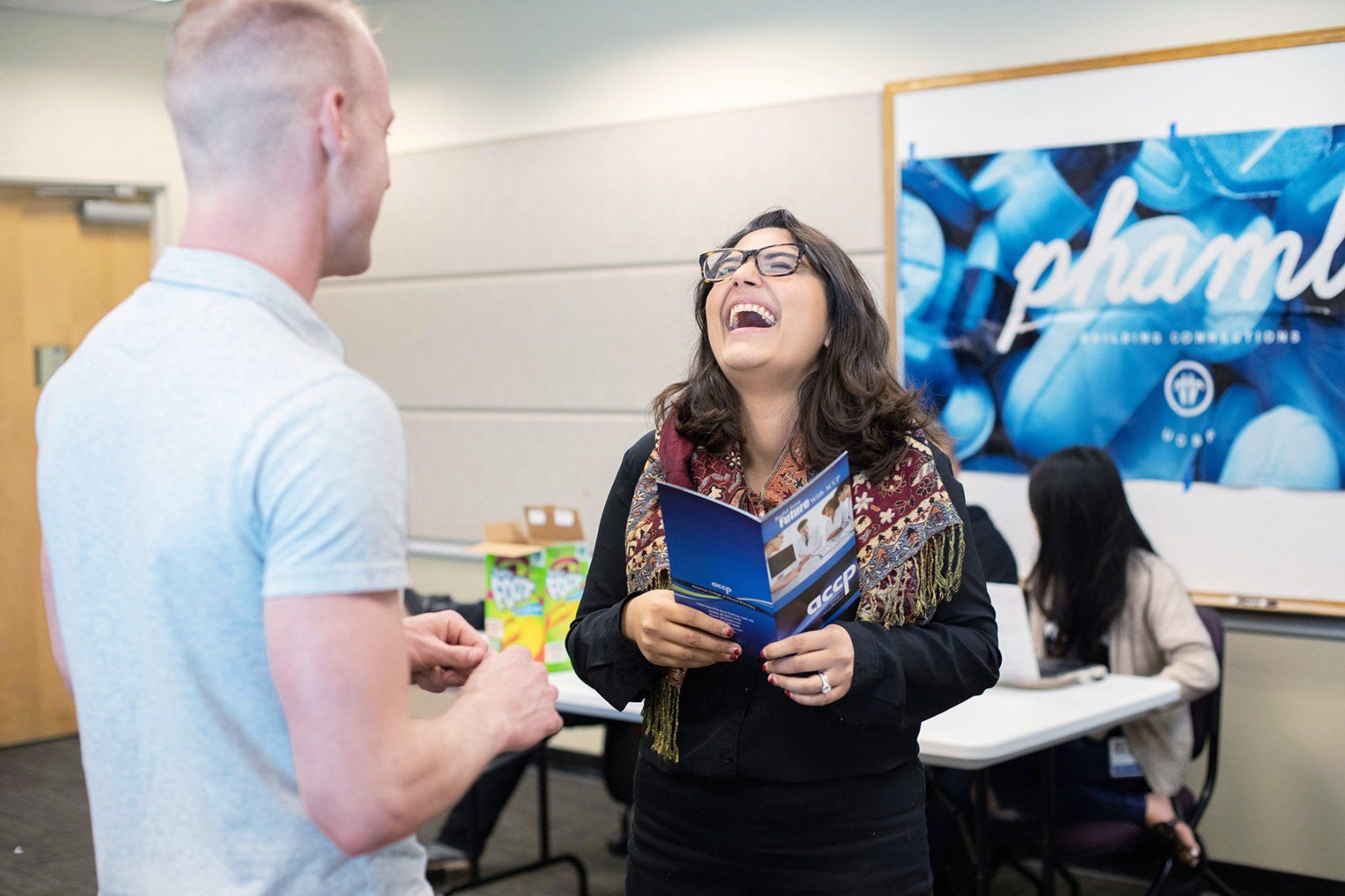
Hanna Yakubi (right) visits with classmate Brian Gac at the UCSF School of Dentistry annual Registered Campus Organizations (RCO) fair. Photo by Susan Merrell
Hanna Yakubi, School of Pharmacy ’21
Born and raised in Fremont, Calif., Hanna Yakubi is the daughter of Afghan refugees who fled the Soviet War in the late ’80s to seek a safer life in the Bay Area. Her going to college was especially meaningful for her mom, who never got the chance because the family could not afford to send her to school along with her brothers. “So she was able to kind of live it through me and seeing me graduate college was really a source of pride for her. She’s happy to have her daughter have the opportunity,” said Yakubi. “That was the one time I’ve ever seen my mom cry.”
So I learned how to make the most of the people around me and how to know when to ask for help and seek help when I needed it.
Yet her close-knit family also had a hard time having Yakubi far from home when she went away to college at UC Irvine. She transferred to UC Davis for the last two years in order to be closer to home. When she got into UCSF for pharmacy school, her parents were also hesitant. “It was tough to convince my family to let me go. But once they understood why I wanted it, they were all for it. So it was more of like that emotional boundary I had to get over to get here,” she said.
Without family members who had walked the path before her, Yakubi had to find mentorship from other places. “So I learned how to make the most of the people around me and how to know when to ask for help and seek help when I needed it,” she said. Being the trailblazer in her family means she can be that support for her younger sister, who is a rising sophomore in college. “Every mistake that I make, or every rough patch I hit, is one less rough patch for her, because there will be someone there to guide her,” she said.
Find resources for first-generation students at UCSF’s First-Generation Support Services »